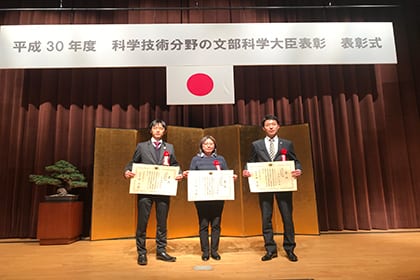JAXA’s Activity of JEM Small Satellite Orbital Deployer (J-SSOD) win MEXT’s Prize for Science and Technology in the 2018 Commendation
Last Updated:
May 10, 2018
JAXA’s activity using JEM Small Satellite Orbital Deployer (J-SSOD) took Prizes for Science and Technology (in the Science and Technology Promotion Category) at the 2018 Commendation for Science and Technology by the Minister of Education, Culture, Sports, Science and Technology (MEXT), the latest in a series of accolades that the Ministry presents to those who have made noteworthy contributions in the fields of science and technology.
At the commemoration ceremony held on April 17, 2018, at Lecture Hall MEXT, Kunihiro Matsumoto (Senior Engineer of the JEM Utilization Center), Shiho Ogawa (Director), and Hiroki Akagi (Engineer) were awarded certificates and plates of achievement by the MEXT Minister Hayashi.
Awarded JAXA personnel (Credit: JAXA)
(From left, Kunihiro Matsumoto, Shiho Ogawa, Hiroki Akagi)

|

|
Plate and certificate of achievement (Credit: JAXA)
Japanese Experiment Module “Kibo” is the only place to deploy the
small satellites remotely from the ISS.
We have been deployed many small satellites for colleges and enterprises around the world.
Awardee’s comment
This award is given to a fruit of concerted efforts and support among concerned agencies, JAXA personnel, the operation team, strategic partners, international partners for the realization and continued operation of the JEM Small Satellite Orbital Deployer (J-SSOD)program. We would like to extend here our sincere gratitude to each person concerned in the program.
Overview of the award-winning program
Name of award-winning program
Promotion of space utilization technology through JEM Small Satellite Orbital Deployer (J-SSOD)
Awardees
Kunihiro Matsumoto Senior Engineer of the JEM Utilization Center, Shiho Ogawa Director, and Hiroki Akagi Engineer (JAXA)
Overview
Recently, many researchers and companies have been studying and developing microsatellites as a means for easy-to-use technical demonstration and human resource development, increasing its utilization demand worldwide. Despite the growing demand, microsatellites faced a challenge, which was their markedly limited utilization opportunities hampered by the main utilization condition of launching on board rockets scheduled to be launched to deploy them.
In the program, the Japan Aerospace Exploration Agency (JAXA) developed an initially unexpected new means, the JEM Small Satellite Orbital Deployer (J-SSOD), by using the functions unique to “Kibo”, Airlock and Japanese Experiment Module Remote Manipulator System (JEMRMS) , ahead of the US and announced its utilization opportunity. Currently, along with the doubled satellite deployment capacity, JAXA has released 205 micro/nano-satellites from “Kibo” (as of February 23, 2018) by supporting the operation of a satellite deployment mechanism developed by a US company, thus contributing to the promotion of space utilization in the world as well as in Japan.
The program has enabled JAXA to contribute to the deployment of the first satellites of emerging countries in the space field by providing them stable deployment opportunities, essentially under the cooperation with the United Nations Office for Outer Space Affairs and the strategic partners (Hokkaido University, Tohoku University, and Kyushu Institute of Technology), consequently enhancing Japan’s presence as an approach to boost the country’s achieving the Sustainable Development Goals (SDGs) .
*All times are Japan Standard Time (JST)

Comments are closed.